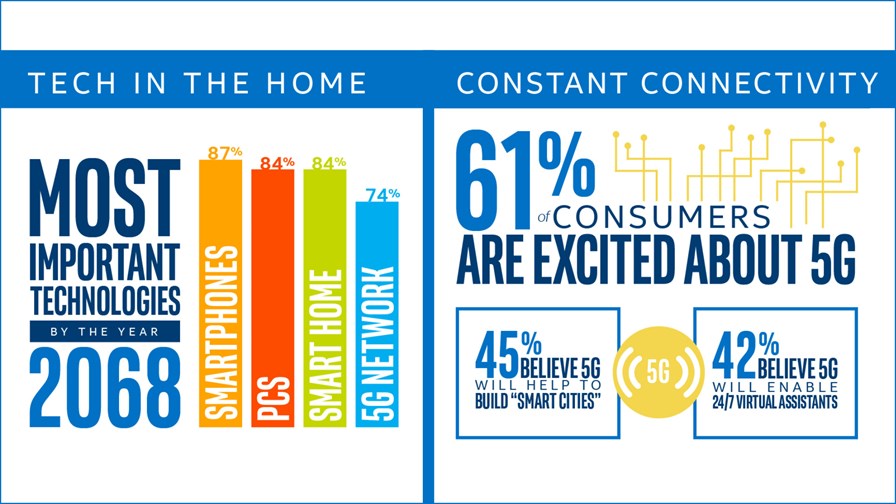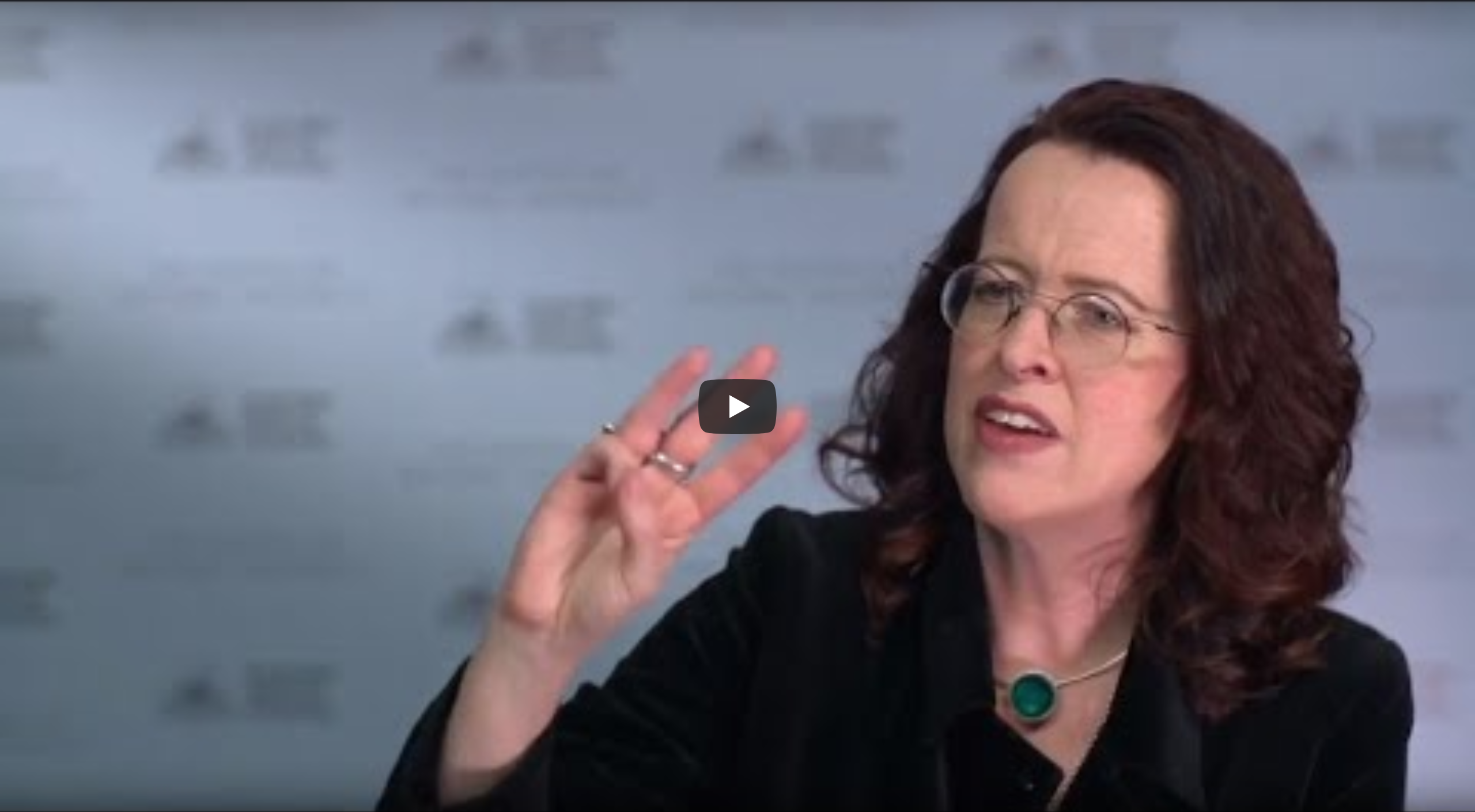
© Intel
- Consumers see the familiar (smartphones and PCs) when they look to the future
- 80% believe smartphones and PCs will continue to be important in 50 years
- Smart homes and 5G also figure highly in the list of emerging tech
- Millennials are the most excited about autonomous vehicles and VR/AR
It’s true what they say about the risks associated with asking people what improvements or new services they want – they’ll instinctively skew their answers towards what is familiar to them today. Present them with a completely new concept, one with which they have no prior knowledge or experience, and they’ll struggle to accept it and view it as significant – until they actually see it and use it for themselves.
Case in point is a new survey from Intel, which has just done celebrating its past 50 years and is now looking towards the next 50. Intel conducted a survey of 1,000 consumers, conducted with research firm PSB, to determine prevailing perceptions about the future of technology. Yet despite the plethora of emerging and potentially ground-breaking innovations, it’s the evolution of the familiar smartphone and computer that consumers are most excited about.
It’s all very well for us in the tech community to start talking about the “post-smartphone age”, but we must not forget that “what comes next” will likely take consumers by surprise and be highly disruptive to today’s tech landscape. After all, who, just a little more than a decade ago, thought a slab of glass and an app store would prove to be so revolutionary.
When asked the question “how important do you think the following technologies will be in the average person’s daily life”, consumers ranked smartphones highest as “very important” with 62 per cent, followed by computers (58 per cent), then came smart home technology at 53 per cent and 5G at 47 per cent. Perhaps unsurprisingly, the “not familiar enough with this technology” response reached double-digits for 5G, cloud computing, AI, VR/AR and gene therapy.
“It’s hard to fathom going a day without using a computer or a smartphone, both of which will undoubtedly continue to evolve along with other technologies,” said Genevieve Bell, VP and Senior Fellow at Intel. “But newer, emerging technologies like AI and 5G are abstract, and harder to grasp, likely leading to anxiety around what they may bring.”
In a sign that “5G” has already infiltrated popular culture, 61 per cent of consumers said they were somewhat or very excited about the potential of fast 5G communications.
There were some salient points brought up by respondents. The majority of consumers surveyed think that 50 years from now, technology will result in over- dependence and people will spend less time interacting with each other. Also, nearly all consumers (88 per cent) are concerned about the security and privacy of their personal information online.
“The possibilities of technology are boundless, but there’s also a clear responsibility for those creating and developing such innovations,” added Bell.
Original Press Release:
Consumers see a world of contradictions in emerging technologies
Intel Study Evaluates the Next 50 Years of Tech
NEWS HIGHLIGHTS
- Consumers see the familiar when they look far into the future. Over 80 percent report believing that smartphones and PCs will continue to be important in 50 years.
- Consumers are split on whether technology will bring them closer together or further apart from friends and family.
- Consumers have mixed views of artificial intelligence in the future, and over one-third don’t believe they use AI today.
SANTA CLARA, Calif., Aug. 22, 2018 – Americans are excited about the future potential of technology, but 40 percent believe emerging technologies will introduce as many new problems as solutions in the next 50 years. This finding comes from Intel’s “Next 50” Study of 1,000 consumers, conducted with research firm PSB, to determine prevailing perceptions about the future of technology.
“Emerging technologies have the potential to transform many aspects of our everyday life,” said Genevieve Bell, director of the 3A Institute, Florence Violet McKenzie Chair and distinguished professor at the Australian National University, and a vice president and senior fellow at Intel. “Studies like this remind us about the diversity of human experience. When we talk about the future of innovation, we’re talking about a range of ideas, technologies and attitudes that will impact our lives in important ways.”
Most Exciting Technologies of the Future
Even as consumers anticipate new technologies, they remain most excited about those that are most familiar. The survey revealed that consumers expect to rely most on smartphones (87 percent) in the future. Consumers also ranked PCs (84 percent) and smart home technology (84 percent) among the most important technologies in the next 50 years.
“It’s hard to fathom going a day without using a computer or a smartphone, both of which will undoubtedly continue to evolve along with other technologies,” added Bell. “But newer, emerging technologies like AI and 5G are abstract, and harder to grasp, likely leading to anxiety around what they may bring.”
Among emerging technologies, consumers reported being the most excited about those with the potential to improve health, including genomic medicine (39 percent) and artificial materials for organ or tissue transplants (26 percent), as well as renewable energy (36 percent).
Parents Excited by AI
Artificial intelligence was especially highly rated by millennials and parents excited by its potential to assist them in their daily lives:
- 51 percent of parents expect AI to increase their quality of life by enhancing and automating everyday tasks, compared to just 38 percent of respondents without kids.
- Parents are more excited than non-parents over AI’s potential to assist with human tasks (46 percent versus 39 percent of non-parents) and predict their needs (42 percent versus 30 percent of non-parents).
However, many consumers don’t recognize the role AI already plays in their lives. Despite the proliferation of voice assistants, predictive algorithms and other common AI applications, more than one-third (36 percent) of consumers think they do not own any technologies that use AI.
Anxieties and Opportunities in a World of Connections
While most consumers rely heavily on technology to stay in touch with friends and family (53 percent), many respondents reported that they fear people will develop an overdependence on technology and will spend less time interacting with each other (56 percent).
Further, 37 percent of consumers and 38 percent of tech elites are concerned people may be isolated from one another when they use technology.
Despite these anxieties, consumers are still excited by emerging technologies that could help bring people together and create more time for connections, such as 5G networks and smart home technology:
- A significant 61 percent of consumers are somewhat or very excited about the potential of speedy 5G communications. Millennials in particular are more optimistic about the future of 5G, with 45 percent saying it will bring people closer together by helping them to always be connected, as opposed to 35 percent for those aged 35 and older.
- Today, only 18 percent of consumers heavily use technology to manage their homes, but 69 percent expect to do so within 50 years.
“The possibilities of technology are boundless, but there’s also a clear responsibility for those creating and developing such innovations,” continues Bell. “Here at Intel, we’re fully committed to the next 50 years and beyond of bringing responsible, life-changing technology to people around the world.”
The “Next 50” Study was sponsored by Intel and developed by PSB. Read the full report.
Study Methodology
PSB conducted research on behalf of Intel to explore attitudes and perceptions of technology today and 50 years from now. To meet these objectives, PSB conducted an online quantitative study from May 9-20, 2018 among the U.S. general public (n=1000) and U.S. technology elites (n=102). The U.S. general public were polled to national census data to ensure a representative sample of the United States. All technology elites are aged 25 years or older with at least a college education, have a household income of at least $100,000 and follow news about technology closely. The margin of error for the general public total sample is +/- 2.53 percent and larger for subgroups. The margin of error for the technology elites total sample is +/- 8.12 percent and larger for subgroups. PSB, a member of Young & Rubicam Group and the WPP Group, is a global research-based consultancy specializing in messaging and communications strategy for blue-chip corporate, political and entertainment clients. For more information, visit www.psbresearch.com.
Email Newsletters
Sign up to receive TelecomTV's top news and videos, plus exclusive subscriber-only content direct to your inbox.






